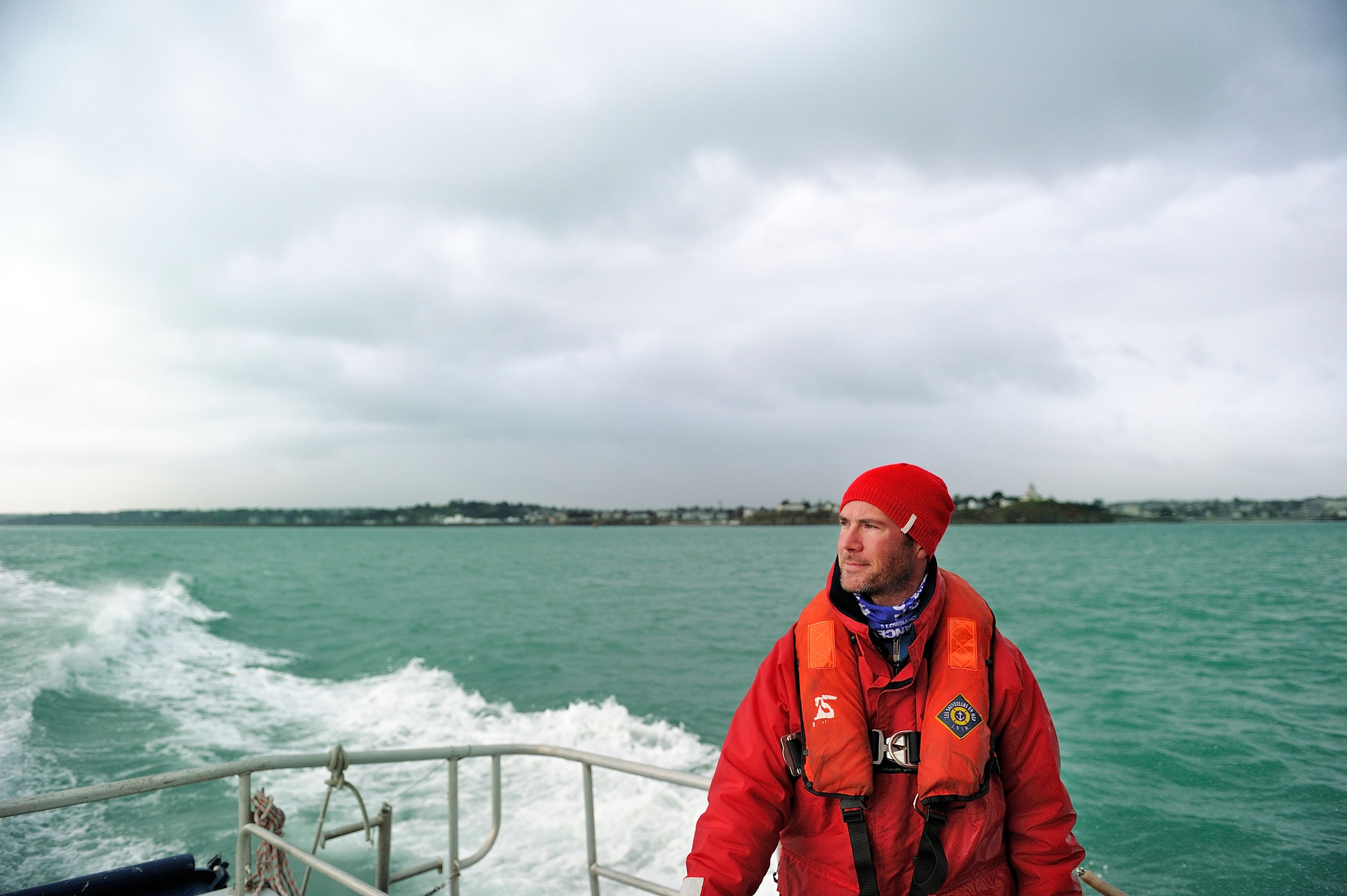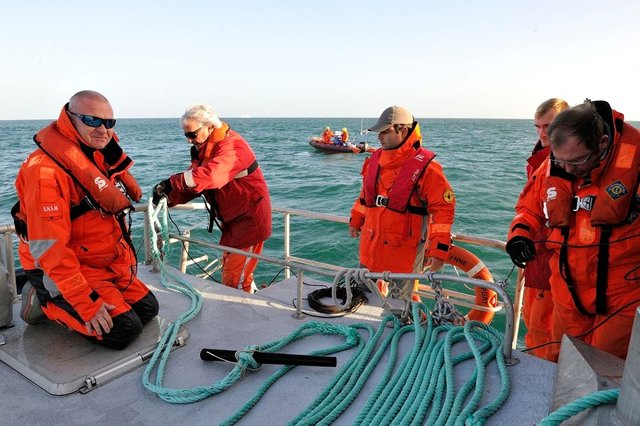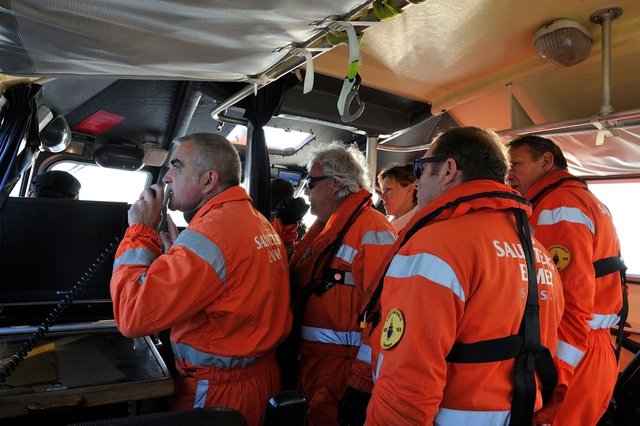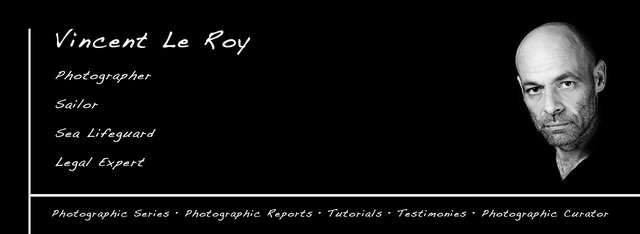Becoming a Rescuer at Sea ... Why and how?, by @vincentleroy (translation from French)
This is an authorized translation in English of a post in French by Vincent Le Roy (@vincentleroy): Devenir Sauveteur en Mer... Pourquoi et comment?
Note that the person that speaks here is NOT me, Vincent Celier (@vcelier), but Vincent Le Roy (@vincentleroy).
Notes:
- The SNSM is the Société Nationale de Sauvetage en Mer, the French equivalent of the British Royal National Lifeboat Institution.
- A "zodiac" is a small rigid inflatable boat with an outboard motor, named after the French company that produced such inflatable boats.
Introduction
Saturday noon at the SNSM station, it's a ritual: the aperitif. It's without fuss. A table in the shed, a few drinks and something to nibble. This is especially the time when everyone meets, come see the schedules, and gets the information to register for a scheduled operation or training. This is also the moment when the group enjoys seeing each other because it is a very close group of people. A fortnight ago, then, on the occasion of the aperitif, I saw Ronan just arriving. I know him well as we have worked together in another association. That day, he came to register. Eight days later, he starts his training and is at sea with a team. I did some photos of his first outing and apart from his singular story, I'm going to talk to you today about volunteers and recruitment.

Why do you become a sea rescuer?
Unlike firefighters, rescuers at sea are not paid. For the most part, they are volunteers. Yet there are so many formations, so many constraints and interventions of all kinds. Recruitment is therefore delicate but vital for the existence of an SNSM station. All the more vital because a banal intervention among firefighters mobilizes only a van and two or three men. At the SNSM, it takes a minimum of 6 per crew whatever the intervention. The recruitment of new volunteers is therefore essential to ensure continuous operation. The first legitimate question could therefore be: why do we come to the SNSM and why do we stay there?
At first glance, one could say that the main motivation for rescuers at sea is to save people. The slightly heroic side of the case. Well no! Those who have this motivation as their first intention do not stay. After six months, they realize that very seldom go out in intervention while they need to be often available. Those ones, they quickly disappear. In fact, the real driving force of long-running volunteers is the need to be on the water. On the water or in the water because there are many swimmers at the SNSM. In short, it is this love of the sea that is our link. What unites us. And when we came for this, whatever its path, we stay there.
As a result of this love of the sea and the constraints that the SNSM imposes, a good part are former career military guys from the French Navy. With two obvious advantages: they are already operational and above all very disciplined. The second major category is found among teachers because they have availability. This is often the subject of jokes between the two camps. Finally, there is a third category: boaters and often sailing guys (those who have sailboats) and who are delighted to be able to come out in winter when their boats are on shore for wintering. The common point of all these rescuers, it is thus the love of the sea. And Ronan does not escape the rule: teacher in availability and always on a boat. The SNSM is therefore logical for him.

Training ... again and again!
The following week, Ronan is embarked for his first training. The training lasts about a year even if after a few months, depending on his involvement and ability to do, you can become a 7th man like me. 7th man, we are not yet officially teammate but we are registered in the schedule and we can go out on interventions. We help as best as we can and we continue to learn. It's the team boss who chooses. But before being 7th man then confirmed teammate, the training goes through three phases: the basic actions on the boat, the permits (coastal, offshore, radio ...) and all notions of first aid quite advanced and that we must validate again every other year.
The elementary gestures on a boat are learned by practicing. Each week, the boat goes out with a crew for a false intervention and we tirelessly repeat the same gestures. When we think about it, there are very few. But the idea is to reproduce them without panicking whatever the situation and whatever the state of the sea. Day and night. It is therefore necessary to know how to prepare a towline (the rope that will make it possible to pull a ship wrecked), to launch a heaving line (rope with a ball, called monkey's fist, to launch to a boat in distress), to know how to quench a waterway with the motor pump (quench = dry out a boat that takes the water), to know how to get out and pilot the little zodiac that is in the big boat etc... And for his first outing, Ronan is immediately in the juice: on the small zodiac, equipped with the motor pump, here he goes dry a boat…
Training is not just for newcomers. To be operational in all weathers, the crews are composed half of new guys and half of experimented ones who come to do and redo the elementary gestures. And it is this mix that makes training very effective for newcomers. The sharing.

In a family!
This Saturday, Ronan came back very happy. His intention to join us has become obvious. He is already part of the group. And it's also one of our engines. We are a group, all animated by this love of the sea. A group ... I will even say a kind of family. This spirit is difficult to describe, you rather have to feel it. The new guy is immediately included in the group, he is not seen as a constraint but as a chance. He will find his place very quickly. Here in our station, I did not see any ego, everyone has skills, everyone puts them at the service of the group because it must be kept in mind that if interventions are to save lives, our first goal is to make sure we never put ourselves in jeopardy. You will understand, we are not heroes, we are just perfectly trained professionals and especially passionate about the sea.

I'm done with my little column today. The next to come: SNSM interventions!
-- Vincent Le Roy (@vincentleroy)

All photos are property of @vincentleroy and under copyright


Heroes are really a great greeting to them
Salvation of the soul is a great work, and its reward will find it good in its life
Thanks for sharing
This is a very intense occupation and one of great importance. Lives areliterally on the line.
really an exciting story !thanks for sharing @vcelier.
I also had this set up in my mind that people want to be Hero's so they stay at sea or become volunteers just to help people. I think every lay man would say this but here you given us the other perspective and the most genuine one because these people simply love the sea, they are swimmers and their mind n soul even their hearts, it's with sea. As I say do where your Heart belongs.. Again a work where lot of dare, bravery and courage is needed. One more courageous post :)
this is a sacred duty to the savior of the soul, salvation is the most important of all aspects of the activity, I strongly agree with this, thanks @ vcelier.
I notice people who love the sea and the ocean are like artists. Like an artist needs to create, they don't just like the sea - they NEED it. It gives them a reason to live. A joy of feeling connected to creation. Thanks for sharing :)
I didn't know that sea rescuers are not paid, this task is very dangerous. I would say for those who stay as Sea Rescuers are real Heroes, even if you or the rest of your pals don't claim it, it actually makes you more than a Hero. Just like a leader doesn't claim to be a good one. Big salute!
Thannks a lot for introducing us a new place.We can take out many information from your every blog.
Thanks
@resteem & follow done.
this is a great story.. this photography is amazing dare! upvote and resteemit done!
Waw amazing